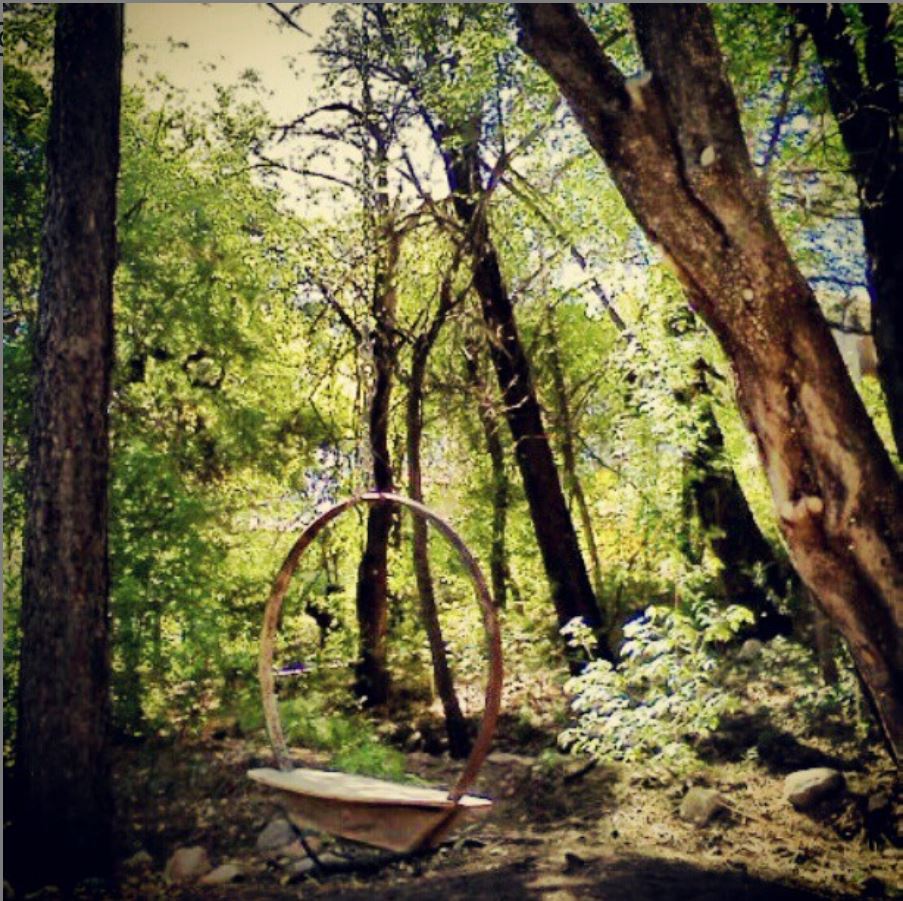ROADSIDE ATTRACTIONS: Lessons on Self-Care in Kingston, New Mexico

Middle Percha Creek, which runs near Kingston, New Mexico. (Photo by Tristan Scroggins)
Kingston was one of the first weird places that I ended up in because of music. Kingston is a ghost town in the Black Range mountains of southwestern New Mexico. After a silver strike in 1882, Kingston quickly became one of the fastest growing and eventually largest towns in the West, peaking in 1885 with a population exceeding 7,000. The town was originally called Percha City due to its proximity to Middle Percha Creek. The name eventually changed to Kingston in honor of the Iron King, the largest mine among the 30 dotting the hillside. My dad had read some book about the area, and whenever the subject came up he would say “it was the first city west of the Mississippi to have electric lights. There were a dozen whorehouses and no church so the whores collected money to build a church to make the town look more respectable.”
The old bank is still in town and was owned by a local artist who took a liking to us. She gave us a tour of the place, which served half as a museum of the town’s history and half as her gallery/studio. I can’t remember for sure but I’m pretty sure she liked to paint in the vault. At one time that vault held a massive amount of money, but the gold standard replaced silver in 1892, causing silver prices to plummet and inciting the Panic of 1893. Kingston dried up and now only 32 residents live in the small town off the highway.
A couple of my dad’s musician friends from Kansas had moved down there and would persuade him to visit by organizing a show. The first show we played, when I was 10 or 11, was in the Black Range Lodge, which is, I believe, the only functioning business in town since the pie stand by the highway shut down. The Lodge is a bed and breakfast operated by a former assistant Hollywood film director turned straw-bale house expert, and a handyman/massage therapist/singer-songwriter. They were always very kind to me even during my angstiest years. Except for when I would get caught stealing wine during parties.
There was always a party when we came to town. Kingston was my first experience with this phenomenon. A band coming to play music in a small town is a special occasion, so everyone takes a break from their chores and responsibilities to let loose and be entertained. At first, it was a special occasion for me too because I was getting to do something other than just going to school. But the more we traveled, especially during holidays, the more I started to feel trapped by this idea that I was expected to have a good time whether I wanted to or not. So I would fluctuate wildly between trying to have a good time as a kid at an adult party and sulking in my room.
I was frequently petulant about these trips, complaining a lot about being in an actual ghost town with no contact with the outside world. During one party, I did meet another young person that I could relate to. He went to school in the nearby city of Las Cruces but every weekend, every holiday, every day off, his family would drive up to their house in Kingston, where he was the only person in town under the age of 30. I did also meet my first girlfriend at the Lodge. She was there singing with her mother and her mother’s partner in a folk trio and after a few hours alone upstairs we ended up holding hands because I was very shy and 12.
Kingston is a very beautiful place that taught me to appreciate the community of a small town and learn what joy music can bring to those communities. As we kept coming back, word would spread and our crowds would grow until we eventually starting playing in an old school house in neighboring Hillsboro. (Hillsboro is also notable for its scenic beauty as well as for its cop car parked by the main street with a safety dummy inside, which causes people from out of town to slam on their brakes as they drive by).
I struggled for a long time with feeling guilty about wishing I was somewhere else while everyone was enjoying themselves and thanking me for being there. I would eventually learn that it was possible for me to not necessarily want to be somewhere and still be a gracious performer, and that by acknowledging my needs and desires, I could better serve the needs and desires of other people, especially onstage. It’s taken me a decade to begin to find a balance between being an entertainer and taking care of myself. Kingston was instrumental in this learning process and I’m thankful to the town for being encouraging to me even while I was stealing their wine and ignoring them to play video games and brood. I can’t help but be nostalgic about the characters who watched me grow up every time I’d visit their ghost town.




